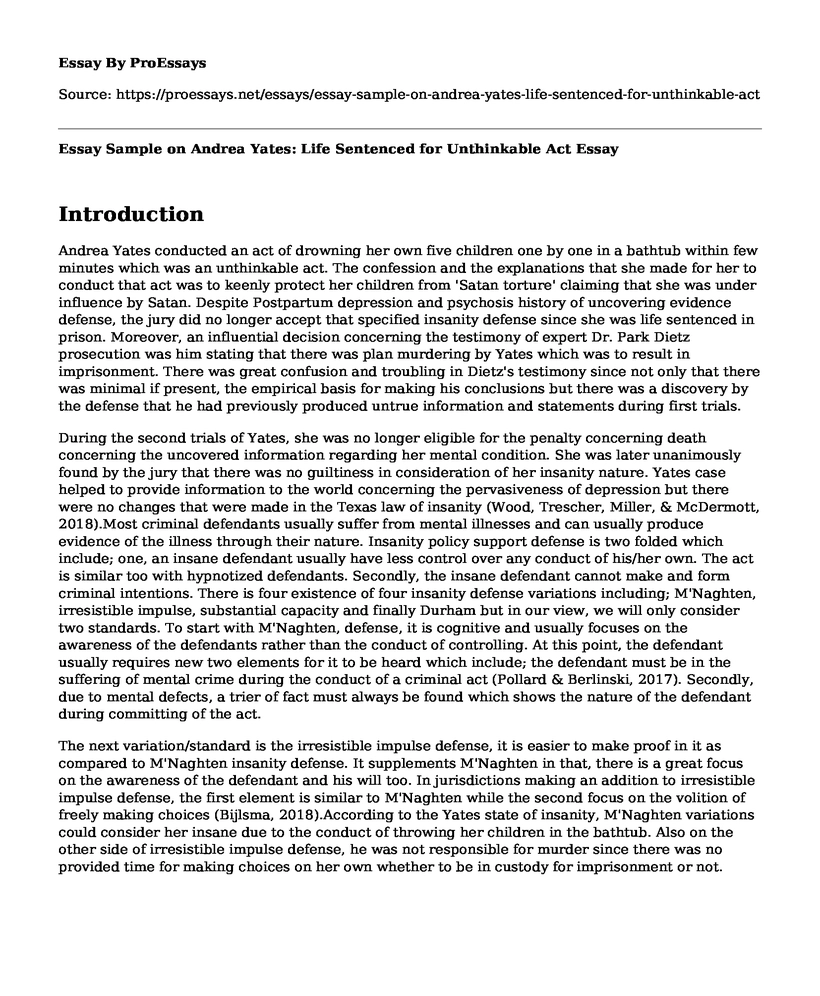Introduction
Andrea Yates conducted an act of drowning her own five children one by one in a bathtub within few minutes which was an unthinkable act. The confession and the explanations that she made for her to conduct that act was to keenly protect her children from 'Satan torture' claiming that she was under influence by Satan. Despite Postpartum depression and psychosis history of uncovering evidence defense, the jury did no longer accept that specified insanity defense since she was life sentenced in prison. Moreover, an influential decision concerning the testimony of expert Dr. Park Dietz prosecution was him stating that there was plan murdering by Yates which was to result in imprisonment. There was great confusion and troubling in Dietz's testimony since not only that there was minimal if present, the empirical basis for making his conclusions but there was a discovery by the defense that he had previously produced untrue information and statements during first trials.
During the second trials of Yates, she was no longer eligible for the penalty concerning death concerning the uncovered information regarding her mental condition. She was later unanimously found by the jury that there was no guiltiness in consideration of her insanity nature. Yates case helped to provide information to the world concerning the pervasiveness of depression but there were no changes that were made in the Texas law of insanity (Wood, Trescher, Miller, & McDermott, 2018).Most criminal defendants usually suffer from mental illnesses and can usually produce evidence of the illness through their nature. Insanity policy support defense is two folded which include; one, an insane defendant usually have less control over any conduct of his/her own. The act is similar too with hypnotized defendants. Secondly, the insane defendant cannot make and form criminal intentions. There is four existence of four insanity defense variations including; M'Naghten, irresistible impulse, substantial capacity and finally Durham but in our view, we will only consider two standards. To start with M'Naghten, defense, it is cognitive and usually focuses on the awareness of the defendants rather than the conduct of controlling. At this point, the defendant usually requires new two elements for it to be heard which include; the defendant must be in the suffering of mental crime during the conduct of a criminal act (Pollard & Berlinski, 2017). Secondly, due to mental defects, a trier of fact must always be found which shows the nature of the defendant during committing of the act.
The next variation/standard is the irresistible impulse defense, it is easier to make proof in it as compared to M'Naghten insanity defense. It supplements M'Naghten in that, there is a great focus on the awareness of the defendant and his will too. In jurisdictions making an addition to irresistible impulse defense, the first element is similar to M'Naghten while the second focus on the volition of freely making choices (Bijlsma, 2018).According to the Yates state of insanity, M'Naghten variations could consider her insane due to the conduct of throwing her children in the bathtub. Also on the other side of irresistible impulse defense, he was not responsible for murder since there was no provided time for making choices on her own whether to be in custody for imprisonment or not.
Conclusion
However, the circumstances that could have led to I have an opposite conclusion is through taking a look at her nature concerning normal individuals( Denno,2017).Claims of the possession and control of her decision my Satan were one of the examples of making a view of his/her nature. She was unable to make sound decisions on her own and due to the maximum effects of insane in cases of poor medications, she not to be judged normally like other normally functioning individuals. There was no available room for choice-making since was unable to do so. Thus in my view, the judges were to conclude fain but not life imprisonment.
References
Bijlsma, J. (2018). A New Interpretation of the Modern Two-Pronged Tests for Insanity: Why Legal Insanity Should Not Be a Status Defense. Neth. J. Legal. Phil., 47, 29.
Denno, D. W. (2017). Andrea Yates: A Continuing Story about Insanity. The Insanity Defense: Multidisciplinary Views on Its History, Trends, and Controversies, 367-416.
Pollard Jr, R. Q., & Berlinski, B. T. (2017). Forensic Evaluation of Deaf Individuals: Challenges and Strategies. Journal of social work in disability & rehabilitation, 16(3-4), 261-275.
Wood, E. F., Trescher, S. A., Miller, M. K., & McDermott, C. M. (2018). Individual differences related to support for insanity and postpartum depression legal defenses: the mediating role of moral disengagement. Psychiatry, psychology and law, 25(2), 219-236.
Cite this page
Essay Sample on Andrea Yates: Life Sentenced for Unthinkable Act. (2023, Jan 31). Retrieved from https://proessays.net/essays/essay-sample-on-andrea-yates-life-sentenced-for-unthinkable-act
If you are the original author of this essay and no longer wish to have it published on the ProEssays website, please click below to request its removal:
- Essay on 14th Amendment and Key Court Decisions From 1870-1930
- Why Marijuana Should Not Be Legalized - Controversial Essay
- Essay Sample on Marijuana in California
- Possession of a Firearm and Constitutional Rights Paper Example
- Psychological Study of Prisons and Prisoners
- Health Care in Prisons: A Human Right or Luxury? - Essay Sample
- Paper Example on Sarah and Michael: Unpacking Wealthy's Crimes and More on YWA







